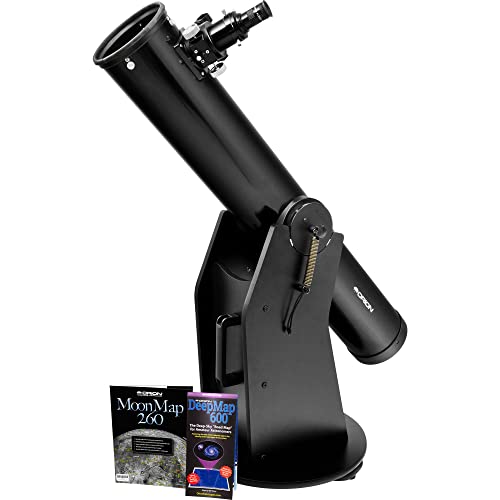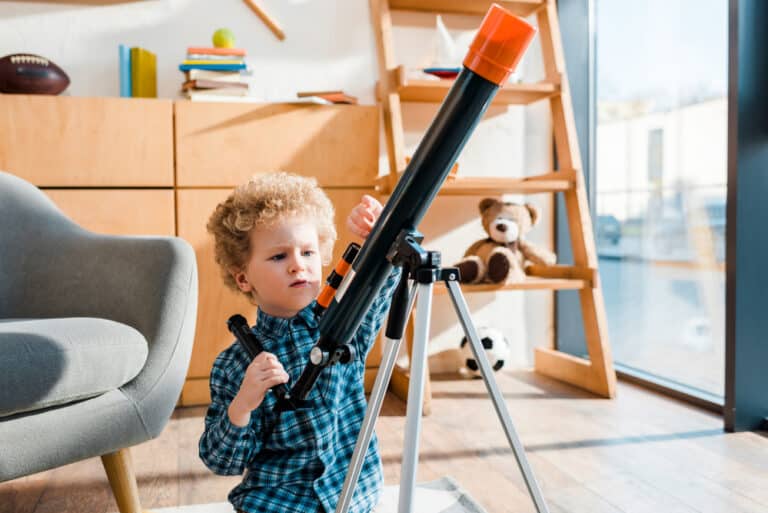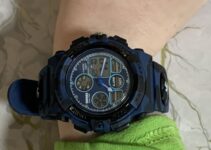It’s always good to encourage your kid’s hobbies, and if that hobby includes getting some fresh air and exploring the great outdoors, then even better!
A great telescope will bolster your child’s passion for the vast night sky, while a bad one could dampen this intrigue, and the telescope will just end up in the back of your child’s closet like every other 2-week fad hobby they tried out.
That’s why I want to help you find the best telescope for kids that we can find. I hope that by the time you finish this article, your kid will be well on their way to being a master astronomer who can name every star in the night sky. Keep reading to see which products made the cut and were named the best telescopes for kids.
Table of Contents
My Top Picks for the Best Telescopes for kids in 2024
#1: Sky-Watcher Heritage-76 Mini Dobsonian Telescope (Best Value)
My list starts off with the Sky-Watcher Heritage-76. Get used to the name Sky-Watcher. You’ll see it again on this list, and you’re sure to find this brand on just about any list of the best telescopes for kids or anyone for that matter. Here are the features that helped the Sky-Watcher Heritage-76 earn the title of my best kids’ telescope.
The Stylish Finish
It’s no secret that pretty packaging will attract anyone to a product, and that goes double for kids. If your kid shows an interest in the solar system, that could be ruined by handing them a dull and boring black telescope. But the dazzling design of the Sky-Watcher Heritage-76 makes sure that your child will want to use their brand new telescope every chance they get, and they’ll be much more encouraged to explore the night sky and get acquainted with all the celestial objects out there in deep space. When you’re encouraging children to engage in a new hobby, you need to know your audience, and the Sky-Watcher Heritage-76 definitely knows its audience.
Solid Specs
While a pretty package might get your child started, it’s obviously going to take more than that to keep them engaged in their new telescope. Luckily, the Sky-Watcher Heritage-76 has all the solid specs you need for quality performance that will keep your child stargazing for hours on end.
This top-ranked kids’ telescope has a 300mm focal length that will give you a good view of all the popular celestial objects, including the Moon, the Andromeda Galaxy and the Pleiades.
There’s also a beginner-friendly finderscope that will help your child survey the vast expanse of the night sky before zooming in on something of interest, and the Sky-Watcher Heritage-76 refractor telescope comes with two eyepieces, which means this telescope will provide larger and brighter images than you ever thought possible.
Yet another boon of the Sky-Watcher Heritage-76 refractor telescope is that the base is made of wood. This is particularly great for a kid’s telescope, as your child is less likely to break their brand-new telescope. The Sky-Watcher Heritage-76 is also small and light – it has a weight of just 2 kilograms or 4.4 pounds – and, perhaps best of all, it’s cheap. That means the Sky-Watcher Heritage-76 is giving you a cheap telescope that your child can actually move on their own, and that they won’t break. That’s a pretty hard deal to beat!
Drawbacks
While the base is made of wood, the finderscope is made of plastic and is not exactly the most durable. Other than that, there are no real drawbacks to this top-ranked kids’ telescope. It obviously isn’t as powerful as the Hubble telescope, but it gets the job done and will keep your kid engaged. And its great price gives it an amazing value, which is why the Sky-Watcher Heritage-76 earned my pick as the best kids’ telescope on the market in 2022.

The second product on my list of the best telescopes for kids is the Orion FunScope 76mm Tabletop Reflector Telescope. Just like Sky-Watcher, you’re sure to see Orion on any list of the best telescopes, for kids or otherwise, and you’ll definitely see them again on this list.
However, unlike our previous telescope, the Orion FunScope 76mm Tabletop Reflector Telescope is not something you’ll be purchasing with pocket change. This telescope costs a pretty penny, but there’s a reason for that. Keep reading to see why you might decide to splurge and buy your budding astronomer the Orion FunScope 76mm Tabletop Reflector Telescope.
Included Moon map
An immediate return on the high price of this premium reflector telescope is the included moon map. This makes the Orion FunScope 76mm Tabletop Reflector Telescope ideal for beginners, and your child will have a handy guide from the get-go that will help them use their new telescope to gaze at the beautiful celestial objects of the solar system.
The short focal length of the Orion FunScope 76mm Tabletop Telescope means that this telescope is better for searching for (relatively) closer deep space objects, but that everything in the forefront will really pop, and you and your child will be in awe of the full beauty of the night sky. And thanks to the included moon map, you’ll actually know what you’re looking at!
This telescope will help even younger kids become pros in no time.
The Reflex Sight
Sometimes you may just want to just get lost in the wonders of space, but it can help your younger kids if there’s something to help you stay focused. The reflex sight on our second-ranked telescope for kids will help your child zone in on whatever is in the center of the telescope’s lens and get a more in-depth knowledge of even the most distant objects. This telescope is perfect for anyone who prefers a more guided experience.
Drawbacks
While the Orion FunScope 76mm Tabletop Telescope isn’t the most affordable telescope out there, it definitely lives up to its price tag.
Of course, because of the price, this telescope is probably more suitable for older kids. Just about the only complaint customers had with this telescope is that it’s a little unbalanced, but since there’s a lock to keep it in place, that problem basically sorts itself out. If you want to spend the extra dollar to get your child one of the best telescopes for kids that money can buy, you’ll need to splurge for the Orion FunScope 76mm Tabletop Telescope.

#3: Orion SkyQuest XT6 (Best for Older Kids)

Orion makes their second straight appearance on our list, this time with the SkyQuest XT6 telescope. Just like our previous Orion telescope, this product isn’t the cheapest telescope out there, but it has some amazing specs that really make it worth the money. Because it’s a little more expensive and a little more advanced, you definitely won’t want to buy this for your younger kids, but your teens will love it. Keep reading to see why
Amazing magnification
With telescopes, it’s pretty intuitive that farther is better. And with that in mind, it’ll be pretty easy to convince your young astronomer that the Orion SkyQuest XT6 is the best telescope out there. With this Orion telescope’s 300x zoom you’ll be able to see even the most distant objects like they’re right there next to you. Your child will be able to scope out everything in the solar system. The galaxy is your oyster with this telescope, and your older child will be occupied for hours on end with all of the celestial objects they’ll be able to see.
Smartphone compatibility
A big reason that this kids’ telescope is more suitable for older children is that our next feature is maybe a bit of a waste on much younger kids. The Orion SkyQuest XT6 telescope is smartphone compatible and it comes with an adapter that will allow you to take photos on your phone through the lens of the telescope. Your child will be able to show off their beautiful deep-space photos to all of their friends and have real concrete proof of the progress they’re making in their new hobby. If your child is interested in both astronomy and photography, then the Orion SkyQuest XT6 is the only telescope for them.
Drawbacks
The boon of this telescope – that older kids and teenagers will love it – is also the main drawback of the third telescope on our list. If you came here looking for something for your eight-year-old, then this is not the product for you. It’s much too big for younger kids, and even older children will probably need some help setting it up. Of course, another drawback of this product is that it’s not exactly a budget telescope. But, just like with our last Orion telescope, it’s clear where your money is going. If you want to get your oldest in on a new hobby, then the Orion SkyQuest XT6 is the telescope for you.

#4: Sky-Watcher Infinity-76P (Best Low Cost)
The final telescope on our list of kids’ telescopes has one major thing going for it: it’s cheap. Really cheap.
The Sky-Watcher Infinity-76P telescope is probably the cheapest telescope you can find, and your younger kids will love it, and even be able to use it on their own.
Child Friendly
The Sky-Watcher Infinity-76P weighs just over 2 pounds, so even your smallest kids will have little problem moving it and setting it up on their own, and its dimensions are quite small, so it won’t take up much room.
This portable telescope is the most child-friendly product you can find, and it’s an amazing (and quiet) way to keep your child occupied in an independent way.
Easy Set-Up
The Sky-Watcher Infinity-76P telescope comes with a 15x eyepiece, a stand, and that’s about it. There’s almost nothing to set up, it’s small, cheap, and convenient, and it even comes in a funny shape that your younger kids are sure to love.
Drawbacks
The obvious drawback of the Sky-Watcher Infinity-76P is that it’s not nearly as powerful as some of the other kids’ telescopes on our list, but it’ll still give your young astronomer plenty to look at that they wouldn’t have access to with the naked eye or with binoculars, so you’re still getting the obvious utility you’d want from a telescope.
This budget telescope is a great way to get your 5-year-old interested in astronomy and it’ll allow you to make a small investment early on to see if this is really the hobby your kid is looking for. The Sky-Watcher Infinity-76P is one of the best telescopes out there for any parent trying to keep things nice and cheap and is an excellent beginner telescope for your young child.
How I Determined the Best Telescope for Kids
It stands to reason that you wouldn’t really look for the same traits in a telescope for adults vs one for kids. But what exactly do you look for in the best telescopes for kids? First and foremost I looked for products that offer solid zoom and high performance. I checked all of the best reviews and online stores to see what the customers loved and looked at the specs to make sure the hardware is up to our standard. After that, I considered some other traits, which I’ll get more into below, and ran them all together to determine which telescopes were best.
What Should You Look for in a Telescope for Kids?
It helps to have all your ducks in a row when you’re making a shopping decision, especially with something like telescopes which not everyone is exactly well-versed in. I tried to keep things as simple and formulaic as possible to help you make the best decision possible. I used a set list of criteria to evaluate the telescopes on our list. Keep reading for the full list of criteria.
Zoom
This one is pretty obvious. The whole point of a telescope is to see farther than you can on your own, so it stands to reason that good zoom is the most important feature. I want you to be able to all of the beautiful stars of the night sky with image quality that will blow you away. A good zoom equals a good telescope.
Extra features
Especially since we want to hold the interest of your little ones, a few extra features will really go a long way. Any feature that makes a telescope more accessible for kids is a huge plus in our book. That can mean including maps, a locking feature, a smartphone adapter, a finder scope, or anything else you think of. I want to make sure your kid has all of the bells and whistles on their telescope.
Price
I know how it can be with kids. They’re begging for something for weeks, and then when you cave and actually buy it for them they’re bored of it in a few hours. That’s unfortunately just the risk you run when trying to foster your child’s passions and creativities. I want to make sure you’re not gambling too much money when you try to find out if this astronomy kick is for real. Especially for the telescopes geared at an even younger audience, we really made sure to prioritize cheap telescopes. That being said, I tried not to sacrifice too much. At the end of the day, getting a decent product is what’s most important.
Frequently Asked Questions
It’s very likely that you still have plenty of questions, and that’s completely okay. Most parents aren’t coming into this article with a pre-existing background in telescopes: that’s our job. I made this little FAQ question to try and guarantee that all of your questions are answered and all of your doubts are assuaged. And if we couldn’t answer your question, the internet is your friend.
What’s the difference between a reflector telescope and a refractor telescope?
As soon as you start looking at telescopes, you’ll see people talking about reflector telescopes and refractor telescopes, and you’ll probably be left scratching your head. You definitely need to at least somewhat the difference, so here it is; reflector telescopes, as the name implies, work using mirrors. As per one source “The light coming from a star goes inside the optical tube and is first reflected on the primary mirror, located at the extremity.” The advantage of this is that objects appear brighter than usual in a reflector telescope. However, the image quality isn’t always great, and – this is especially bad for kids – they’re pretty bulky and heavy.
Refractor telescopes are much more straightforward, literally. Light comes in through the end using the lens and funnels towards the eyepiece. This provides better image quality, but a narrower field of vision. Plus, refractor telescopes tend to be more expensive than reflector telescopes.
At what age can a child use a telescope?
Naturally, there are a lot of different variables that will come into play when deciding what’s the right age for your child to receive their first telescope. That being said, it’s generally accepted that 8 is the lowest recommended starting age. Of course, it’s all case-by-case, and you shouldn’t be afraid to buy your 6- or 7-year-old a telescope if you trust them and they’re really showing interest.
Should I buy a regular telescope or a children’s telescope?
Obviously, you came to this article because you’re looking for children’s telescopes. But if you have an older kid that’s really taken an interest, you shouldn’t be too worried about making the jump and buying them an adult telescope. A good children’s telescope should act as a jumping-off point to get your child engaged in the wonderful world of astrology. Once that’s done, they’re ready for the real deal.
Can you take pictures through a telescope?
As we saw with the Orion FunScope 76mm Tabletop Telescope, the very short answer to this question is “yes.” Of course, not every telescope is going to have a designated feature that makes taking smartphone pictures accessible. That being said, you can always just take a picture through the lens, but we can’t promise the best results with that approach if you don’t have an adapter assisting you.
Can you use a telescope during the day?
Yes! This is great news for the kids with early bedtimes or for those of you who live in areas with longer daylight. While there will be a certain dip in visibility, the brightest stars in the sky will still be visible even when the sun is shining, so you don’t have to think of astronomy as exclusively a night-time hobby.
Verdict: Your Best Telescope for Kids
It’s time for a little recap. Your head might be spinning from all that information, and we want to help you make heads or tails of everything. We’ve summed up the most interesting telescopes on our list below, placing an emphasis on the feature that really sets them apart. We hope that this will speed up your buying process and help you find what you’re looking for.
If you want the best value for money, pick the Sky-Watcher Heritage-76 Telescope.
The first product on our list earned that spot for exactly one reason: it’s the best bargain for your dollar. The Sky-Watcher Heritage-76 Telescope is incredibly affordable but still manages to offer fantastic performance. it has a sturdy base and a 300mm focal length that will let you see all of the major deep space objects. On top of that, it’s pretty light and kids of all ages will be able to use this telescope. This should be the first telescope any parent looks at for their young Copernicus.
If you need to take pictures through your telescope, pick the Orion FunScope 76mm Tabletop Reflector Telescope.
Everybody wants something concrete to hold onto after advancing in a hobby. Nothing is a better motivator than observable progress. And that’s why the Orion FunScope 76mm Tabletop Reflector Telescope is sure to keep your child engaged longer than any other telescope. Its smartphone mount will let your child take some amazing astrophotos that they can post on Instagram or print out to decorate their room. This will really let them share their new hobby with their friends. If you have a child that’s just as interested in photography as astronomy, then the Orion FunScope 76mm Tabletop Reflector Telescope is the only telescope for them.
If you want to keep the spending cheap, pick the Sky-Watcher Infinity-76P.
Nobody likes spending money. That goes double for parents who are maybe a little skeptical that their child will stick to this new hobby they’re showing an interest in. This telescope, really a toy telescope at its core, is perfect for your youngest child itching to stargaze. It obviously doesn’t exactly compete with the Hubble telescope, but it’s cheap, small, and has a cute design. For anyone on a budget or parents with a baby genius on their hands, the Sky-Watcher Infinity-76P should be your go-to telescope.
That brings us to the end of our list. We showed you 4 great telescopes, but there are thousands of products out there. Don’t feel shy to keep looking around if none of our products caught your eye. If that’s the case, we at least hope we helped serve as a jumping-off point and that our FAQs addressed your concerns and worries. That’s all for now. We hope your child enjoys the stargazing!





